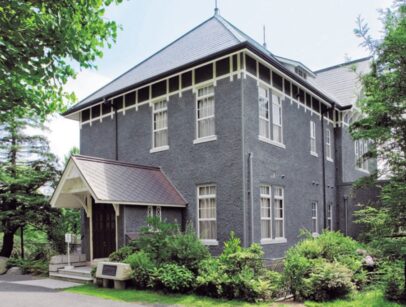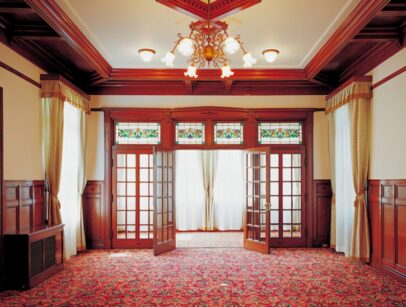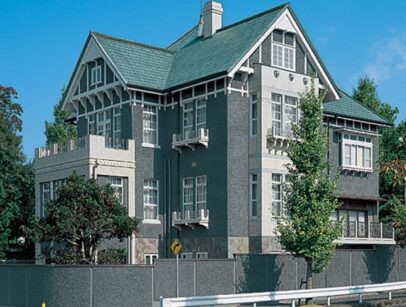About Founder and History
English translation in progress. Thank you for waiting.
Contents
Philosophy
Tenri University aims to realize a society in which diverse people help each other, and everyone’s life is happy and fulfilled. Since its founding in 1925, the University has provided educational programs that contribute to the “spirit of selfless service” that is essential to its realization. And now, in an era of rapid change, we recognize once again that the importance of the education that Tenri University is aiming for is increasing. Therefore, on the occasion of the 100th anniversary of the founding of Tenri University in 2025, we will carry out a reorganization of learning, including a reorganization of the Faculties, in order to widely produce human resources who can contribute to society.
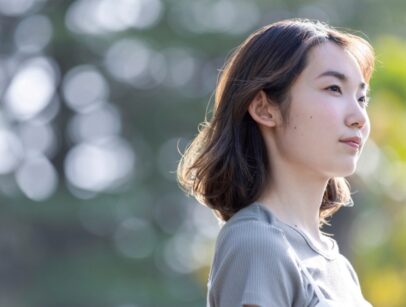
The Founder of the University
Shozen Nakayama, The Second Shinbashira
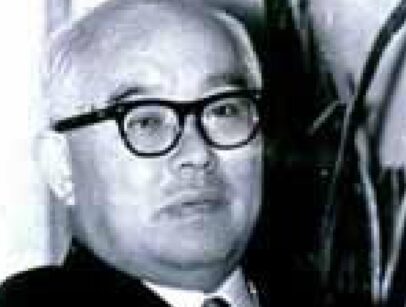
In 1925, the Second Shinbashira, Shozen Nakayama (1905-1967), founded Tenri University’s predecessor, the Tenri School of Foreign Language, with the intention of fostering Tenrikyo overseas missionaries and cultivating them with a rich international outlook through foreign language education. This was the first private foreign language school in Japan.
In a cultural climate that had been preoccupied with the acceptance of Western culture, the school focused on neighboring Asia and became the first private school to offer Korean language education. After several reforms, Tenri University was established in 1949.
Furthermore, the founder studied the history of Christian missionary work in the East, collected many related books, and collected books on cross-cultural studies for students. The result of these efforts was the birth of the affiliated Tenri Central Library, which boasts both quality and quantity both inside and outside Japan. He also conducted his own research on overseas affairs and collected folklore materials from around the world, which developed into the current Tenri University Sankokan Museum.
In addition, the Founder was an avid fan of judo, rugby, baseball, and other sports, and contributed to the popularization and promotion of sports in general. In particular, his efforts to have judo adopted as an official sport at the Tokyo Olympics are worthy of special mention.
The Founder’s foresight and leadership formed the University’s educational basis. Today, the spirit of the Founder is still vividly alive in the educational pursuits of Tenri University.
Founder’s Hall (Wakae-no-Ie)
Donated by the Founder to Tenri University to commemorate its 30th anniversary
The Founder’s Hall (Wakae-no-Ie) stands to the southwest of Hall No. 1 on the Somanouchi Campus. This Taisho Roman western-style building was built in the spring of 1924 as the “Superintendent Public Study Room” when the University’s Founder Shozen Nakayama, the second Shinbashira of Tenrikyo, was a student at the former Osaka High School. It was later donated to Tenri University in commemoration of the 30th anniversary of its founding.
This building was located on the grounds of the Tenrikyo Osaka Diocese Administration Office in Wakae-mura, Nakakawachi-gun, Osaka Prefecture (present Iwata-cho, Higashi Osaka City). It was preserved even after the second Shinbashira graduated from Osaka High School, and later moved to the Tenri University campus and named “Wakae-no-Ie” after its original location. The completion ceremony was held on November 23, 1955.
Founder’s Hall seen from the northeast
"The birth of the School of Foreign Language has a close relationship with this house."


Western-style room on the second floor with a Taisho Roman atmosphere
At the completion ceremony site, the second Shinbashira said:
This house, in the formal sense of the word, was a handover to the university, but in a sense, it signified a joyous rebirth. I considered this house to be a study house, but at the time, at the Diocese Administration Office it also served as the study for the superintendent. In any case, it was here that I spent my younger years. I have endless memories of this house, but I would like to say just a word to the University. It was in this house that the Young Men’s Association held its first meeting when it established Tenri School of Foreign Language, the predecessor of this university. Therefore, the birth of the School of Foreign Language has a close relationship with this house. For this reason, we wanted to move to this location early on, but we could not take the plunge, partly because we thought, “It is better to build a new house than move that old one.” But frankly speaking, from the standpoint of the truth, it was the right thing to do, and we have now done it, disregarding the costs. As for how to use it, I leave that to the school authorities and have nothing to say. What I ask is that you use this house to everyone’s satisfaction and pleasure. I hope that you will use this house with love and care for many years to come.” (from “Tenri University 50th Anniversary Magazine”)Opened as the Founder’s Hall to commemorate the 100th anniversary of the Founder’s birth
After moving to the University, the building was used as an office, conference room, and dormitory for exchange students. In 2005, on the 100th anniversary of the birth of the second Shinbashira, the building was reopened as the Founder’s Hall as a building that bears the significance of the “Founding Spirit.” It is a place that should be visited by all students.
When it was located in Osaka, it was a two-story wooden building with a total floor space of approximately 200 tsubo (approximately 1,860 square meters). It was covered with natural slate and had German walls on the outside. When the building was moved, a basement floor of concrete was added.


Founder’s Hall seen from the southwest
History

History
1925 Tenri School of Foreign Language (coeducational) founded.
天理外国語学校(男女共学)創設1949 Tenri University founded.
天理大学開学1967 Tenri Nursing School established
天理高等看護学院開校
Tenri School of Medical Technology established.
天理衛生検査技師学校開校2012 Tenri Health Care University founded.
天理医療大学開学2023 Consolidated with Tenri Health Care University.
天理医療大学と統合2024 Departments reorganized into 15 Departments.
15学科へ再編2025 The 100th Anniversary of establishment.
創立100周年
History details
1925 February 17 Tenri School of Foreign Language (coeducational) founded.
天理外国語学校(男女共学)設立。1925 April 15 Tenri School of Foreign Language (coeducational) opened.
天理外国語学校(男女共学)開校。1927 December 9 Tenri Foreign Language College founded.
天理外国語学校設立。1928 January 12 Tenri Women’s School: Tenri School of Foreign Language was
renamed.
天理女子学院:従来の天理外国語学校を改称。1940 March 15 Tenri Women’s College founded.
天理女子専門学校設立。1940 April 2 Tenri Women’s College opened.
天理女子専門学校開校。1944 April 1 Tenri Foreign Language College was renamed Tenri Language College.
Tenri Women’s College was renamed Tenri Women’s Language College.
天理外国語学校から天理語学専門学校に校名変更。
天理女子専門学校から天理女子語学専門学校に校名変更。1946 April 22 Tenri Training School for Kindergarten Teachers founded.
天理保母養成所設立。1946 May 27 Tenri Training School for Kindergarten Teachers opened.
天理保母養成所開所。1947 March 31 Tenri Women’s Language College closed (consolidated).
Students relocated to Tenri Language College.
天理女子語学専門学校廃校(合併)。生徒は天理語学専門学校に編入1947 April 1 Tenri Language College became coeducational.
天理語学専門学校が男女共学となる。1949 February 21 Tenri University founded.
天理大学設立。1949 April 1 Tenri University opened.
天理大学開学。1950 March 14 Tenri University Junior College founded.
天理大学短期大学部設立。1950 March 31 Tenri Training School for Kindergarten Teachers closed,
integrated with Tenri University Junior College.
天理保母養成所廃所。短期大学部による。1950 April 1 Tenri University Junior College opened.
天理大学短期大学部開学。1950 December 1 Tenri University Junior College was renamed Tenri Junior
College.
天理大学短期大学部から天理短期大学に校名変更。1957 April 1 Tenri Junior College was renamed Tenri University Women’s Junior College.
天理短期大学から天理大学女子短期大学部に校名変更。1959 March 31 Tenri University Women’s Junior College closed.
天理大学女子短期大学部廃校。1992 April 1 The Faculties of Human Studies and International Culture
Studies established.
The Department of History and Culture Studies in the Faculty of
Letters established.
Three studies in the Department of Budo and Sport
Studies established.
人間学部、国際文化学部開設。文学部に歴史文化学科開設。
体育学部体育学科に3コース制開設。2002 April Center for Liberal Arts Education and Research in the Faculty of Human
Studies opened.
Center for Language Education and Research and International Center for
Regional Studies in the Faculty of International Culture Studies established.
人間学部に総合教育センター、国際文化学部に言語研究センターと地域文化研究センターを設置。2002 March The eleven Departments in the Faculty of International Studies were
reorganized into two Departments—the Department of Asia Studies and the
Department of Europe and America.
国際文化学部の11学部を「アジア学科」「ヨーロッパ・アメリカ学科」の
2学科への改租。2004 April Graduate School of Clinical Human Studies Graduate Program in
Clinical Psychology (Master’s Course) established.
大学院臨床人間学研究科臨床心理学専攻(修士課程)を開設。2010 April The Department of Asia Studies and the Department of Europe and
America in the Faculty of International Culture Studies were reorganized as the Department of Foreign Languages and the Department of Area Culture Studies in the Faculty of International Studies. The Faculty of Budo and Sport Studies expanded from three studies to five studies.
国際文化学部「アジア学科」「ヨーロッパ・アメリカ学科」を国際学部
「外国語学科」「地域文化学科」に改組。
体育学部の3コース制を5コース制に拡充。2015 April The Graduate School of Physical Education Studies, Graduate
Program in Physical Education (Master’s Course) and
Spanish/Brazilian-Portuguese Language Studies of the Department of Foreign
Languages, Faculty of International Studies opened.
大学院体育学研究科体育学専攻(修士課程)と国際学部外国語学科
スペイン語・ブラジルポルトガル語専攻を開設。2017 April The Graduate School of Religion and Culture Studies, Graduate Program in Religion and Culture Studies opened.
The Japanese Language Major, Department of Foreign Languages, Faculty of International Studies was reorganized as the Japanese Studies Course, Department of Area Cultural Studies.
大学院宗教文化研究科宗教文化研究専攻(修士課程)を設置。
国際学部国語学科日本語専攻を地域文化学科日本研究コースに改組。
Tenri University Vision 2025
Tenri University was founded in 1925 as Tenri School of Foreign Language and will celebrate its 100th anniversary in 2025. Inheriting the Founding Spirit, Tenri University declared “Tenri University Vision 2025” as a guide to further enhance education, research, and student support, and to become a university that can meet the demands of society.
The Founding Spirit
Based on the teachings of the Foundress of Tenrikyo (Oyasama), the University’s mission is to nurture people who will contribute to the construction of the “Joyous Life” world.
The kind of people Tenri University aims to nurture
People who, based on their unwavering faith, have an understanding of diverse values and knowledge of the current state of the world, actively contribute to others, and are able to think and act toward the realization of a society in which people can live together.
Philosophy and Mission
Founded in 1925, Tenri University will celebrate its 100th anniversary in 2025.
Over the past century, the University has responded to changes in social conditions while never wavering from its Founding Spirit and has worked to nurture individuals of significance in society here in Tenri.
The significance and mission of the University's existence is to "nurture human resources who will contribute to the construction of the 'Joyous Life' world," as stated in itsFounding Spirit.
In other words, in today's society, the goal is to nurture individuals who, amidst a flood of information and constant environmental change, have a mind to contribute to others based on their knowledge and understanding of spiritual culture, including thought an religion, and who are able to proactively judge what they should do based on their own beliefs and take action.
In such a society, understanding and tolerance of different cultures, including spiritual cultures, are increasingly important qualities. Furthermore, people with altruistic aspirations who can think of others and be there for others also have an important role to play in society, especially now because we have experienced major disasters in recent years.
People equipped with such a desire are required to support today’s society and play an active role in it. This is in perfect harmony with the three pillars of the University: “religious awareness,” “international awareness,” and “spirit of selfless service.”
Toward 2025, the 100th anniversary of our establishment, Tenri University will realize a university that can appropriately respond to the demands of the new era based on our founding philosophy and nurture individuals who can pioneer the future.
1. Education
Basic Policy
Based on the “kind of people we aim to nurture,” Tenri University will nurture individuals who can independently determine what they should do and actively take action. In order to realize that the University will continuously check and improve the quality of liberal arts education and specialized education, as well as its educational policy, and enhance and strengthen our educational capabilities by establishing and functioning an internal quality assurance system for education.
Action Goals
- Strengthen educational capabilities by clarifying and embodying curricular objectives in line with the degree awarding policy.
- Further promote education that fosters not only “religious awareness” but also “international awareness” and “spirit of selfless service.”
- Improve educational effectiveness by strengthening high school-university cooperation and connections.
- Establish a quality environment for improving educational content and capabilities by making the PDCA (Plan-Do-Check-Action) cycle of the internal quality assurance system function.
2. Student Support
Basic Policy
To provide time and places where students can actively engage in studies and club activities in their student life while making the most of their individual characteristics, and where they can lay the foundation for their independent and initiative activities in society in the future. In order to realize that the University will enhance its organizations and
systems to support students in their studies and daily lives.
Action Goals
- Further develop and strengthen the learning support system to enable students to achieve their academic goals.
- Strengthen education and employment support systems that contribute to the improvement of students’ employability.
- Strengthen the support system for student life, which is the foundation of study, including the development of scholarship systems, etc.
3. Research Support
Basic Policy
Based on the belief that the foundation of solid educational capability lies in excellent research (capability), we will strengthen our research support system, including the acquisition of external research funds. Furthermore, we will clarify the research process, actively publicize research results, and enhance the ability to disseminate research.
Action Goals
- Strengthen international collaboration in research activities, including academic exchange with overseas partner universities.
- Aim to strengthen research capabilities through the development of a training leave system.
- Promote the explicit disclosure of the research process and strengthen the ability to disseminate research results.
4. Social Collaboration
Basic Policy
While upholding academic freedom, Tenri University, as a public institution of society, will actively return the results of academic research and education to society. Furthermore, to contribute to the improvement and advancement of education and research, the University will promote cooperation with various organizations in the fields of education, local communities, local government, and industry, and realize a university that is supported by society.
Action Goals
- Further strengthen cooperation with in-service teachers, schools, boards of education, etc., and enhance the quality of the institution as a teacher training institution.
- Support the revitalization of local communities by strengthening partnerships with community organizations and local governments.
- Actively promote social activities through industry-government-academia collaboration, including strengthening ties with industry.
5. Management and Operating Structure
Basic Policy
Strengthen the IR system (Infrared blaster) to assist the executive office, led by the President, in collecting, analyzing, and examining information and issues necessary for academic management.
Furthermore, under the current decision-making system for teaching and learning, a university management organization will be established to enable faster and steadier execution, and SD [(staff development) professional development] activities will be implemented in a systematic manner.
Action Goals
- Establish and strengthen the system for assisting the President and the executive office.
- Rebuild the administrative department structure, including the establishment of a cooperative system for teaching and administrative staff.
- Actively promote staff development to improve the quality of faculty and staff and strengthen the on-site capabilities of the organization.
- Promote systematic maintenance and improvement of facilities and equipment to provide a safe and secure education and research environment.
- Strengthen the financial base to support a stable education and research environment.

